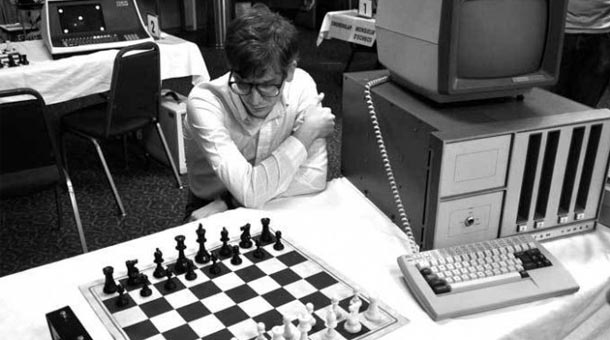
By having strong characters, and engaging story, simple locations, as well as equipment you know and trust, you can really accomplish anything.

By having strong characters, and engaging story, simple locations, as well as equipment you know and trust, you can really accomplish anything.
For me personally, Andrew Bujalski’s Computer Chess was one of the most anticipated films at the Berlinale festival. What made this film so great was the tremendous callback it makes to independent film prior to the DSLR era, when not everyone had access to the “film look,” and made due with whatever they could get their hands on. In the case of Computer Chess, the decision to not go after the coveted film feel was most made likely for aesthetics, but was enjoyable none the less in this quirky comedy about computer programming in the early 80′s.
The film plays out at a small motel, which serves home to an annual tournament in which computer programmers–working at building chess programs–meet to battle their machines against one another to see who has created the best chess program. The style used to tell the story is partially mocumentary, and partially fiction feature. What is most engaging is that the director decided to film the movie on vintage Sony, black and white video cameras in an effort to truly capture the period. The medium does a tremendous job in bringing the audience into the moment. The main character is a young grad student named Peter, who is concerned that his computer is throwing the tournament. In his search to diagnose the problem, he learns that his quest to bring artificial life to a machine may, in fact, be the key to bringing real life and understanding into his own experience.
Computer Chess is full of memorable characters, most notable for me being the character of Michael Papageorge, who is unbelievably reminiscent of an early Chevy Chase in both appearance and antics. Papageorge is one of the more confident members of the tournament, but also one of the least prepared and biggest moochers–he spends much of the film looking for an extra room to stay in and eating from the ice machine.

Computer Chess feels very authentic to the time. The period fits, and the characters function wonderfully within the time. Plenty of old technology will satisfy the analog junkie in all of us, including a vast array of early model computers and the hilarious banter of early speculation as far as the roll computers will play in the lives of future generations. For me, the film held a lot of hometown, old fashion humor and chemistry that I haven’t felt in a film since Napoleon Dynamite. A lot of parallels can be drawn as to the sort of quirky humor, characters, and situations that occur in both films.
Towards the end of the film, a few issues start to arise as far as the technical execution of the presentation. A cut away scene of Papageorge suddenly changes format from the Sony video to 8mm reversal stock in which the audio sync does not match up. The scene plays out for a few minutes before falling back to the video. Other clips in the end also take on a bit more of an avant garde quality, and don’t seem to fit the smooth, quasi-documentary style of the rest of the film. Some of this might be fall on the issues of using such old equipment to make the picture, but it really does give an almost “rough cut” feel to the end of the film, which seems to break up what would have otherwise been a nearly perfect indie period comedy.
In all, I still loved Computer Chess, regardless of some of the jostles towards the end. The characters are refreshingly original and diverse, and the story is exceptionally engaging with wonderful comedic breaks and asides. The style in which it was shot was genius, and I think it can serve as an example to anyone looking to make a period piece on a small budget. By having strong characters, and engaging story, simple locations, as well as equipment you know and trust, you can really accomplish anything.